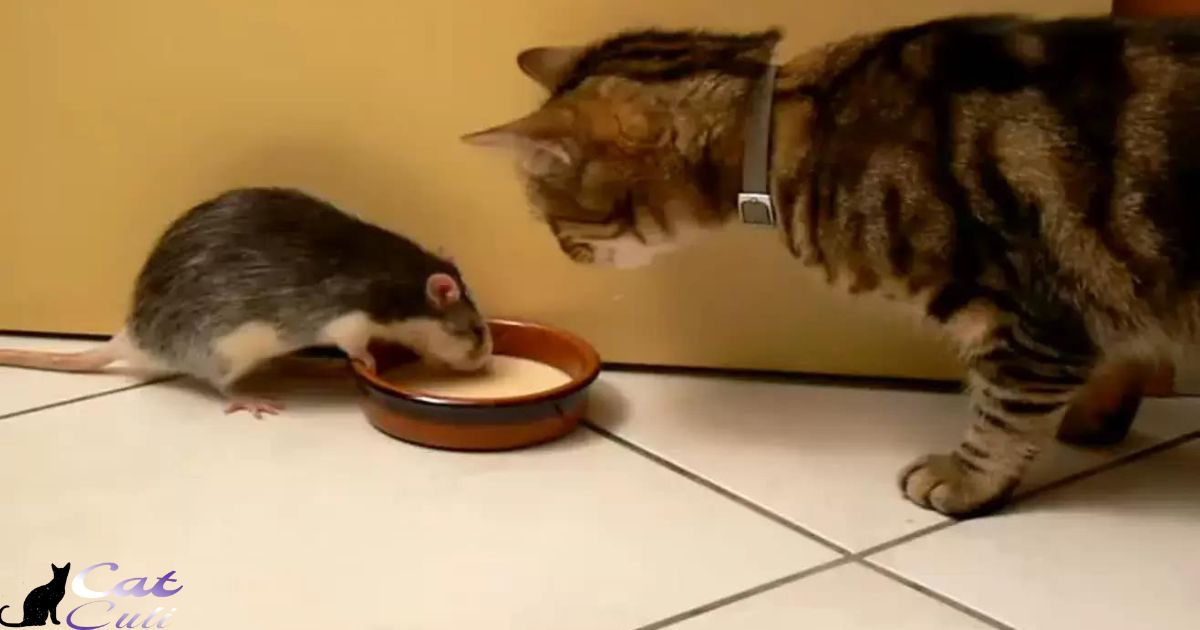Mice might eat cat food since it’s accessible and smells appealing to them. However, it’s not their primary diet. Cats’ food might attract mice due to its scent and ingredients. Nonetheless, mice typically prefer their natural food sources over cat food.
Curious about the dining habits of tiny critters? Wondering, Will mice eat cat food? Brace yourself for a surprising revelation! Understanding these furry creatures’ appetites might just change your perspective on what goes nibble in the night.
Mice are opportunistic eaters and might nibble on cat food if it’s accessible. However, it’s not their primary preference, and they’ll typically opt for their natural food sources when available. Stick around to uncover more about these sneaky nibblers’ dietary preferences.
What Does Mice Eat
Mice have diverse appetites and consume various foods. Their diet mainly consists of seeds, grains, fruits, and vegetables. Additionally, they may indulge in insects and small invertebrates.
These creatures are known to nibble on almost anything they find accessible, making them adaptable eaters.Their natural inclination is towards a plant-based diet, favouring grains and seeds as their primary food source.
Mice are opportunistic feeders, adapting their diet based on what’s available in their environment. This adaptability enables them to survive and thrive in various habitats.
What Does A Mouse Eat
Mice munch on a variety of foods like grains, seeds, and fruits, making them omnivorous creatures. They love to nibble on small insects and even enjoy the occasional snack of cheese or nuts.
Their diet mainly consists of whatever is available in their environment, from leftovers to plants, giving them adaptability in their eating habits.Their tiny stomachs aren’t too picky, allowing them to feast on crumbs or scavenged food.
Their preference for grains and seeds makes pantries and cereal boxes ideal dining spots. These little critters are resourceful eaters, making them quite adaptable to different environments.
What Do Wild Mice Eat
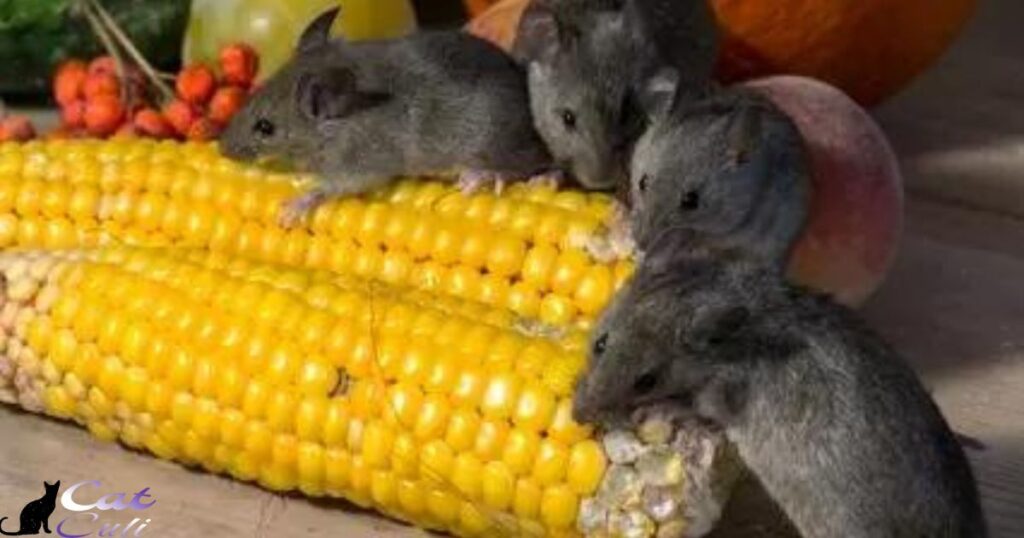
Wild mice have a diverse diet, devouring seeds, fruits, and insects found in their habitat. They relish grains like wheat and corn, along with nuts and berries when available. Their meals often consist of vegetation and small invertebrates, sustaining these adaptable critters in their natural surroundings.
Their diet varies based on seasonal offerings, from fresh greens and fruits during warmer months to seeds and grains in colder seasons. Wild mice display an impressive ability to adapt their diet to what’s abundant in their environment, ensuring their survival in diverse ecosystems.
Mouser Cat Food
Mouser cat food is specially formulated to cater to a cat’s hunting instincts. It contains high protein levels to support a cat’s energy needs and muscle development. This type of cat food aims to simulate the diet of a cat in the wild, focusing on nutrients that help maintain a cat’s overall health and vitality.
With its balanced nutrients and flavors, mouser cat food entices cats to stay healthy and active. It encourages their natural hunting behaviors while providing essential vitamins and minerals. This food option keeps cats satisfied, ensuring they maintain a strong, agile physique.
Why Do Mice Eat Cat Food?
- Availability: Mice might eat cat food due to its easy accessibility in homes or areas where cats roam.
- Nutrient Attraction: Some cat foods contain ingredients that entice mice due to their smell or taste.
- Competition for Resources: In environments where food is scarce, mice might resort to consuming cat food as an alternative.
- Opportunistic Feeding: Mice are known for their opportunistic eating habits and will consume various food sources if available, including cat food.
Does Cat Food Attract Mice?
Cat food can attract mice due to its strong scent and ingredients. Mice are drawn to the smell and might sneak in for a taste if it’s accessible. The enticing aroma and flavours in cat food could lure these rodents into exploring and nibbling around the feeding area.
The strong smell and appealing ingredients in cat food often catch the attention of mice. They may be tempted to visit in search of a snack, finding the scent irresistible. Mice could potentially be attracted to areas where cat food is present, enticed by its aroma and flavours.
What Do Mice Eat?
Mice feast on a variety of foods, ranging from seeds, grains, and fruits to insects and even nuts. They’re omnivores, devouring whatever’s within their reach, including small bits of protein-rich items like cheese or meat. Their diet adjusts to what’s available, making them quite adaptable.
In the wild, mice chomp on plants, seeds, and insects, while in homes, they’ll happily indulge in pantry goods like cereals, grains, or anything crumbly left unsealed. They’re not too picky, munching on diverse edibles they stumble upon in their search for a meal.
How Do I Stop Mice From Eating My Cat’s Food?
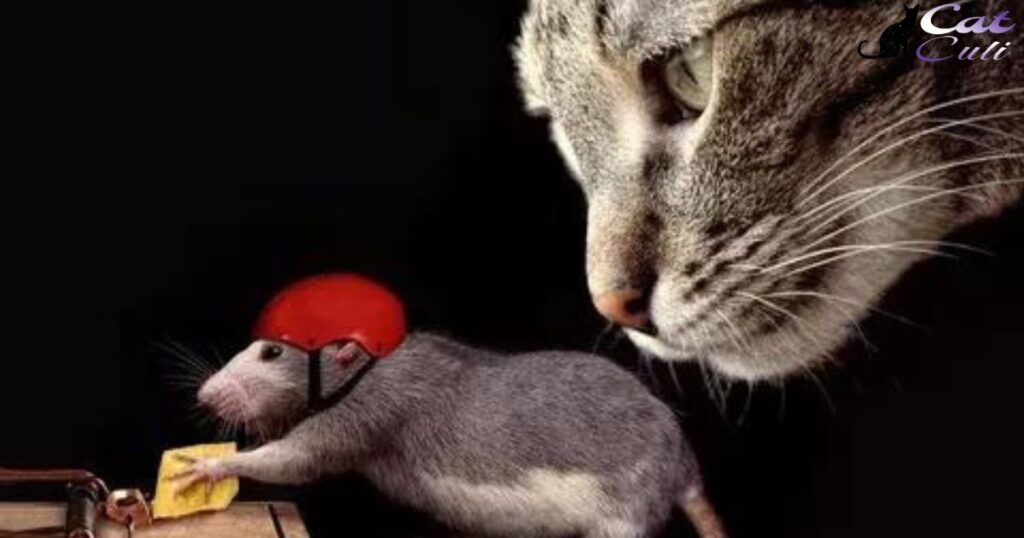
To prevent mice from chowing down on your cat’s food, start by storing it in airtight containers. Keep feeding areas clean and tidy, removing any leftover food promptly. Additionally, consider elevating your cat’s bowls or using raised platforms to make it harder for mice to access the food.
Another effective method is to establish designated feeding times for your cat. Offer food during specific intervals and remove any uneaten portions after feeding time to discourage mice from lingering around the area. Regularly inspect the feeding space for any signs of mouse activity and seal off entry points to keep these pests at bay.
Do Mice Prefer Wet Cat Food Or Dry Cat Food?
| Preference of Mice | Wet Cat Food | Dry Cat Food |
| Attraction | Might be attracted due to the smell | Less likely to be attracted by scent |
| Consumption | Might nibble if accessible | Less appealing due to texture and odour |
| Primary Choice | Not a preferred choice | Not a preferred choice |
| Typical Behaviour | May sample but not a staple diet | Less inclination to consume |
This table summarizes the likelihood of mice preferring wet or dry cat food based on factors like smell, accessibility, and the primary dietary choices for these rodents.
Do Mice Like Cat Food?
Mice find cat food enticing due to its smell and accessibility. They might nibble on it if it’s within reach.Cat food isn’t their preferred choice; they lean towards their natural diet when available.
The appeal of cat food to mice lies in its scent and easy access. While mice may sample it occasionally, it’s not their top choice for sustenance. They typically favour their own food sources over cat food options.
How Can Mice Eat Cat Food?
Mice can eat cat food when it’s within reach. They’re opportunistic and might feast on it if accessible, despite it not being their top choice. Mice prefer their natural food sources but won’t hesitate to munch on cat food if it’s available nearby.
Their tiny size and ability to sneak into spaces allow them to reach cat food. Mice are quick and agile, making it easy for them to access these food sources, even if they’re kept in seemingly secure areas.
Do Mice Steal Cat Food?
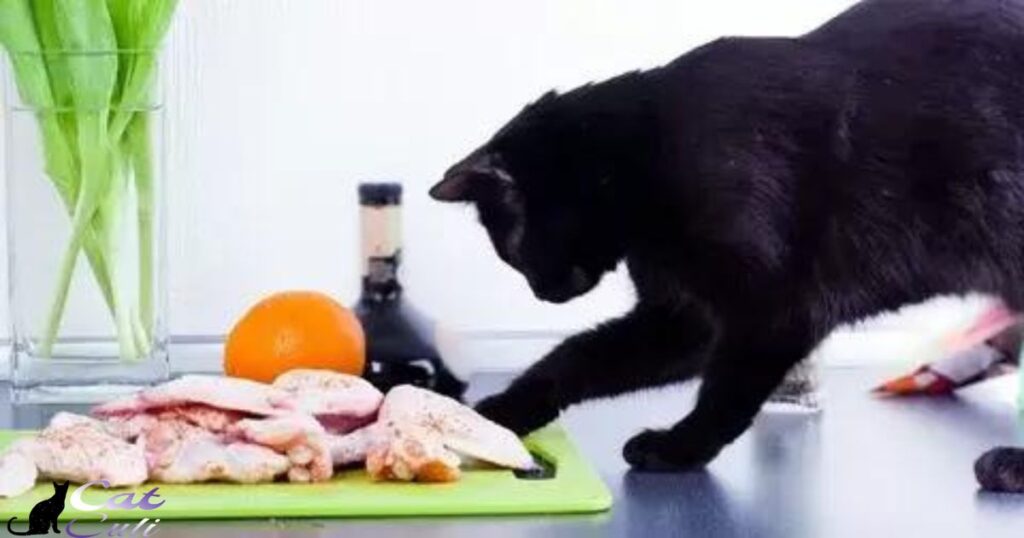
These little critters are resourceful and might sneak in for a quick meal when the opportunity arises. They’re attracted to the scent of cat food but usually prefer their natural diet, although they won’t hesitate to snack on what’s available.
When cat food is left out, mice might see it as an easy meal. They’ll dart in, grab a bite, and scurry away. It’s essential to store cat food securely to deter these tiny thieves from helping themselves to a midnight feast.
Does Cat Food Attract Mice?
Cat food can attract mice due to its strong scent and appealing ingredients. Mice are drawn to the accessible food, but they usually prefer their natural diet. The smell of cat food might entice mice, leading them to explore and nibble if it’s easily reachable.
To prevent attracting mice, store cat food in sealed containers and clean up any spills promptly. Keeping the feeding area tidy and inaccessible to rodents reduces the chances of drawing in these curious nibblers.
Do Mice Like Dry Cat Food?
Mice find dry cat food appealing due to its scent and taste. They’re attracted to it when searching for food, but it’s not their top choice. Given the opportunity, mice will eat dry cat food, but they generally prefer their natural diet of seeds, grains, and fruits.
The smell and texture of dry cat food might entice mice, leading them to nibble on it occasionally. However, mice typically favours their usual food sources over cat food, choosing items found in their natural habitats.
Do Mice Hoard Cat Food?
Mice often hoard cat food if they find it accessible. They’re quick to seize the opportunity to gather and store food for later use. Their natural instinct to stockpile resources leads them to stash cat food in various hidden spots.
When mice encounter cat food, they usually perceive it as a valuable food source. They’ll diligently transport and store small amounts in their nests or burrows, ensuring a reserve for times when food might be scarce.
How To Stop Mice Eating Cat Food?
To prevent mice from munching on your cat’s food, start by elevating the food dish. Place it on a higher platform that mice can’t reach easily. Additionally, seal off any entry points mice might use to access the feeding area. Keep the feeding area tidy, promptly removing any spilled food that could attract mice.
Another effective method is to establish a designated feeding schedule for your cat. This limits the time the food is out and accessible to mice, reducing the chances of them getting a feast. Employing these strategies ensures your feline friend enjoys their meals without unwanted furry guests joining in.
Can Feeder Mice Eat Cat Food?
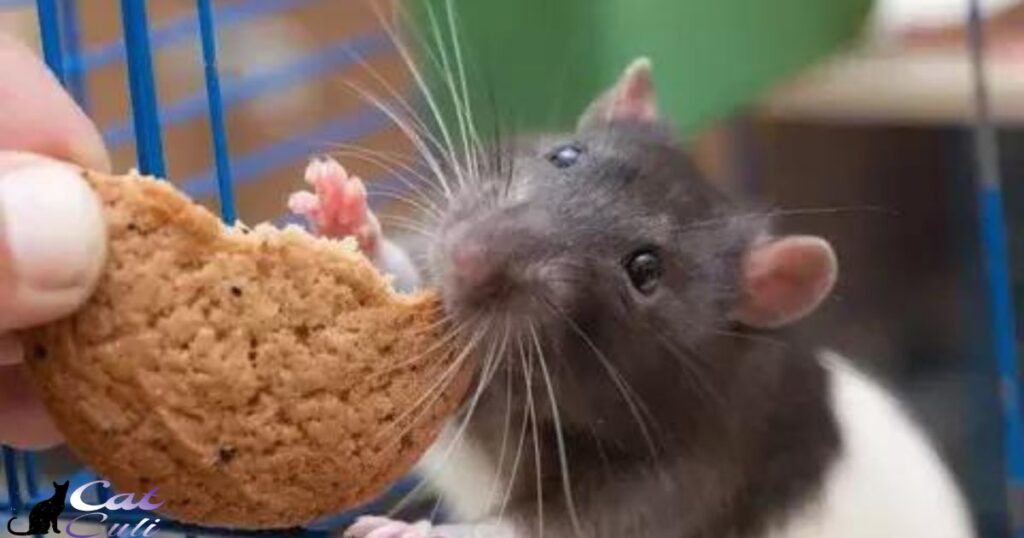
Feeder mice can eat cat food as it’s rich in protein and nutrients. They might munch on it when it’s around, but it’s not their main diet. Feeder mice prefer grains, seeds, and vegetables, but they can consume cat food as an occasional treat due to its high protein content.
Cat food’s smell attracts feeder mice, leading them to explore and taste it. Feeder mice usually enjoy a variety in their diet, and while cat food isn’t their top choice, they won’t hesitate to nibble on it if available.
How To Keep Mice From Eating Your Cat’s Food
To prevent mice from munching on your cat’s food, store it in sealed containers. Place feeding times for your cat and remove the food once they’re done. Keep the feeding area clean to discourage mice from lingering around.
Using elevated feeding stations can also deter mice access. These elevated spots make it harder for mice to reach the food, reducing the temptation for them to feast on your cat’s meals. Regularly inspect the feeding area to ensure there are no entry points for mice to sneak in.
Types Of Cat Food
Understanding these different types helps cat owners choose the best option for their feline friends. It’s important to consider factors like a cat’s age, health conditions, and personal preferences when selecting the type of food to ensure a balanced and nutritious diet for these beloved pets.
Collections Clear
This refers to removing or clearing specific groups or sets of items that are categorized or collected together, ensuring a clean slate without any selected groups.
Product Type Clear
This involves deselecting or removing any chosen categories or types of products, resulting in a reset where no specific product type is selected or filtered.
Brands Clear
This action involves eliminating or deselecting any chosen brand selections, leading to a state where no particular brand is chosen or filtered.
Food Preference Clear
This indicates the action of removing or resetting any selected food preferences, resulting in a state where no particular food preference is chosen or filtered.
Health Benefits Clear
This refers to deselecting or removing any chosen health-related advantages or benefits associated with products, leading to a state where no specific health benefit is selected or filtered.
Can Mice Contaminate Cat Food?
Mice can contaminate cat food if they get access to it. They might leave behind droppings or hair, leading to potential contamination. To prevent this, store cat food in sealed containers and keep it in areas inaccessible to mice. Regularly cleaning the feeding area can also help maintain the food’s hygiene.
Keeping cat food away from mice is crucial. These rodents can carry diseases that could transfer to the food, posing health risks for your cat. By storing food properly and minimizing access for mice, you can ensure your feline friend’s meals stay safe and uncontaminated.
Do Mice Hoard Cat Food?
Mice hoarding cat food is possible. These critters stash food in various places, including cat food if they find it. They do this to prepare for scarcity or as a survival instinct. Mice might hide cat food in nooks or crannies, making it seem like they’ve disappeared overnight.
Their hoarding behaviour is strategic. Mice store food to ensure a steady supply when needed. If you spot missing cat food, those sneaky mice might just be stocking up for later feasts.
Can Baby Mice Eat Cat Food?
Baby mice can eat cat food, especially if it’s softened or broken into small pieces. Their diet is flexible, and they’ll consume what’s accessible for sustenance. However, their primary diet usually consists of their mother’s milk initially.
Can Mice Eat Wet Cat Food?
As for wet cat food, mice can eat it too. Its soft texture makes it easier for them to nibble on. But similar to dry cat food, it’s not their main source of nutrition, and they’ll opt for their natural diet if available.
Do Mice Avoid Places With Cats?
Mice usually steer clear of areas with cats because they fear being caught. Cats’ presence signals danger to mice, making them avoid places where felines roam. Their keen sense of smell detects the cat’s scent, prompting them to find safer spots away from potential predators.
If the mouse is desperate for food or shelter, it might still risk entering a cat-inhabited space. In such cases, hunger or necessity might override their instinctual fear of predators, leading them to cautiously navigate these areas.
Are Mice Attracted to Cat Food?
Mice are attracted to the scent of cat food due to its strong odour and accessible nature. While it’s not their primary food source, they may consume it if available.
Do Mice Eat Canned Cat Food?
Mice might eat canned cat food if it’s accessible to them. However, it’s not their preferred or natural diet, and they typically seek their own food sources in their environment.
Does Leaving Cat Food Out Attract Mice?
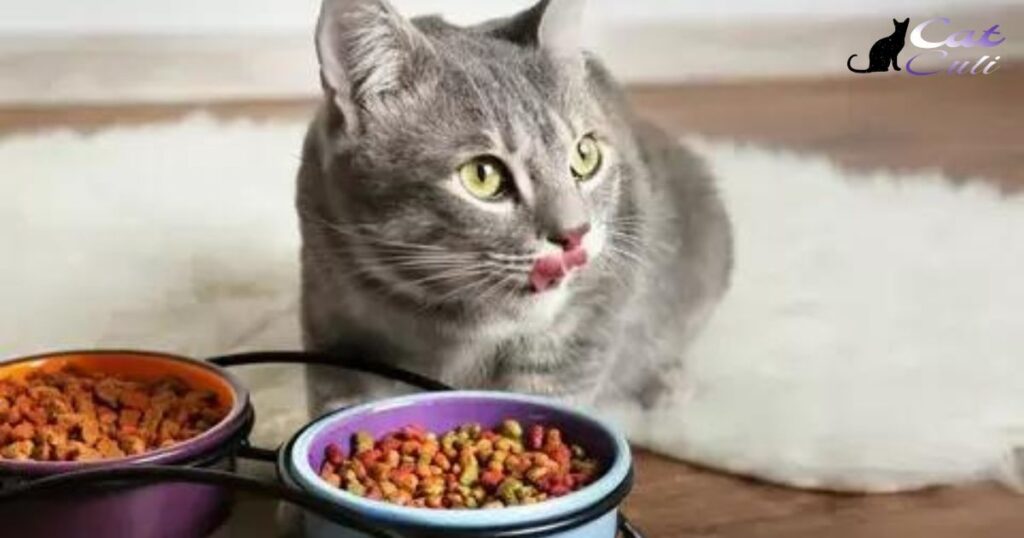
Leaving cat food out can lure mice because of its strong smell and easy accessibility. Mice are drawn to food sources, and cat food can be an irresistible temptation for them. When cat food remains accessible, it increases the chances of attracting these tiny rodents into your space.
To prevent attracting mice, ensure cat food is stored securely in airtight containers after feeding your feline friend. Cleaning up any spilled food promptly can also deter mice from being enticed by the scent and potentially invading your home.
FAQ’s
Does a mouse eat cat food?
Yes, mice eat cat food due to its scent & accessibility. They’re attracted to it, but it’s not their primary diet.
Are rats attracted to cat food?
Rats are attracted to cat food due to its smell. It serves as a potential food source for them, although not their primary choice.
Why is there no mice cat food?
No specific mice cat food exists as mice aren’t a typical pet. Cat food isn’t tailored to their dietary needs.
Conclusion
Inquiring about “Will mice eat cat food?” reveals their opportunistic nature. Mice may snack on cat food if available, drawn by its scent, but it’s not their primary preference. Understanding this helps in managing and preventing unwanted visitors in your home.
To minimize mice attraction, store cat food securely and clean up spills promptly. Remember, while mice might nibble on cat food, it’s just one factor among many that could invite them in. Keeping a tidy space and sealing entry points remain crucial in deterring these curious nibblers.
